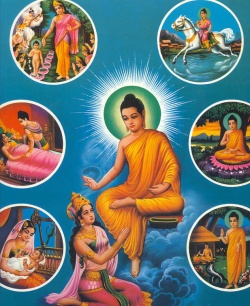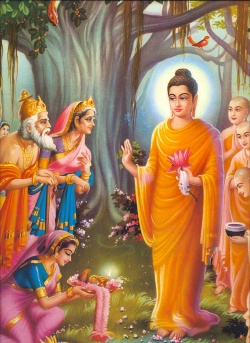Wrong livelihood
This is the fourth article in the series about the Vinaya, that body of monastic rules and traditions binding on every Buddhist monk and nun. In this article I will discuss "wrong livelihood".
Buddhist monastics are called bhikkhus (monks) and bhikkhunis (nuns), which literally means men and women who rely on alms for the necessities of life. That is, they depend solely on the generosity of lay supporters. However, some monks, dissatisfied with the amount and uncertainty of alms, have tried to secure a more comfortable lifestyle by practicing various crafts or trades and expecting a fee. This is called wrong livelihood.
An exhaustive list of examples of wrong livelihood can be found in the discourse of the Buddha called "Brahmajata Sutta" which is in the section of the Tipitaka called "Digha Nikaya". It includes such "priestcraft" as: palmistry, fortune-telling, interpreting dreams, determining propitious dates or sites, exorcism, reciting protective charms, incanting malevolent spells (!), foretelling a person's remaining lifespan, running errands for laypeople, casting astrological charts and so on.
Even earning a living in, what would be for a layperson, a good way such as practising medicine, is for a monk wrong livelihood. There is a story in the Dhammapada Commentary of such a monk who did very well out of practicing as a doctor. One day, this monk received the most delicious almsfood from a man whom he had just successfully treated. On the way back to the monastery, he met Ven. Sariputta, one of the leading disciples of the Buddha, proudly told of his doctoring and offered some of his delicacies to him. Ven. Sariputta was dismayed and walked away without saying a word. Ven. Sariputta loved the simple tradition of depending on alms and he would not eat what was obtained by breaking the precepts, in this case through practicing a craft for personal gain. When he returned to the monastery and related this incident to the Buddha, the Buddha recited the following stanzas:
"Bhikkhus, a bhikkhu who is shameless is coarse in thought, word and deed. He is arrogant like unto a crow. He will secure a comfortable living through unlawful means. On the other hand, life for a monk who has a sense of moral shame is not easy." (Dhammapada 244-245)
It is allowable for a monk skilled in medicine to treat people staying at the monastery, even to help those visiting -- but not to make a business out of it.
In the texts there are several stories where the Buddha, seeing an occasion to be of service, stopped while on almsround to give an inspiring teaching to a layman. The layperson would then run into the house and get some food to offer as a "reward" but the Buddha would always refuse it. He explained that Enlightened Ones do not teach for a fee. Teaching for personal gain is also wrong livelihood. Teaching is a monastic's way of giving, of serving, and it should never be regarded as a profession, selling the teachings for material gain.
A corrupt monk who tells fortunes for money, gives talks in exchange for gifts of practices any similar form of wrong livelihood has a special name in Buddhism -- he is called allajji (rhymes with Apache), meaning "shameless". Good monks are advised to shun shameless ones and if a group of allajji monks congregate in a neighbourhood the good monks are to go there and send them away (as in Sanghadisesa 13).
To emphasise the seriousness of the offence of wrong livelihood there is a well known quote from the Suttas. (The quote should be well known anyway, for it was printed in our newsletter two issues back!)
"There are, monks, these four stains because of which the sun and moon glow not, shine not, blaze not. What are these four?
Rain clouds ... snow clouds ... smoke and dust ... and an eclipse. Even so, monks, there are these four stains because of which monks and nuns glow not, shine not, blaze not. What are these four? Drinking alcohol ... indulging in sexual intercourse ... accepting the use of gold or money ... and obtaining gifts through the wrong livelihood." (Anguttara Nikaya 2.53)
It is clear, then, what the Buddha thought of allajji monks who predict lottery numbers, give astrology readings and so on, for personal gain. They are grouped along with a monk who gets drunk, has sexual intercourse or keeps money. Monks who practise wrong livelihood are a stain on the Sangha should be known as such by the laypeople.

